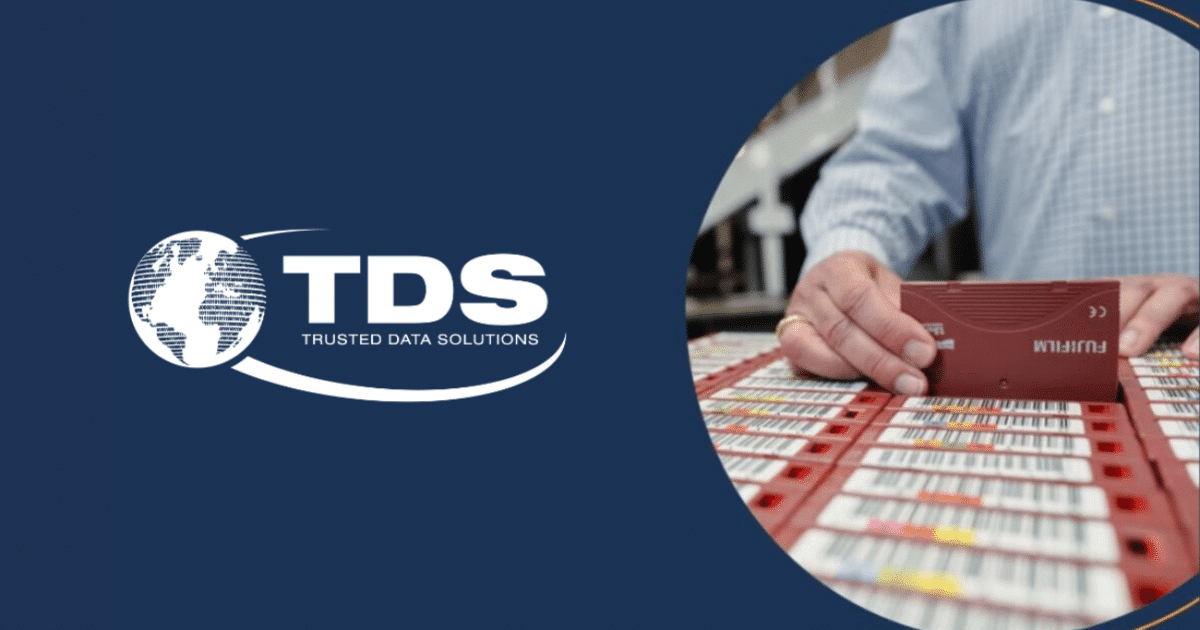By Steve Flitter, Director of Sales and Business Development, Trusted Data Solutions
Trusted Data Solutions (TDS) is a legacy data transformation company that makes data accessible in any format at any time. We improve enterprise data access and restoration strategically to ensure that clients’ needs are met, successfully and with trust which enables solution provider partners to extend their services offering and portfolio via our TrustedPartner Program.
We have a long-standing history transforming legacy data. With deep roots in IT engineering, TDS has a wealth of experience reading, restoring, and processing data, inclusive of audio files from backup tapes. Our ability to extract email files from backup tapes led us to be the first in the market performing email archive migrations. For almost three decades we’ve been the contact point for corporations, law firms, litigation and eDiscovery consultancies, and government agencies requiring access to legacy data no matter the format in which the data was originally created. Given the task, we can recover, restore, and migrate any data to contemporary formats.
Today, as more organizations move their data to the cloud – we’ve extended our services and partner program to facilitate this migration. Our partners can leverage our expert skills and trust that their clients’ data will be strategically migrated, no matter the source or cloud destination easily, effectively, efficiently and maintaining a complete chain-of-custody.
Our comprehensive portfolio of services and proven track record in managing legacy data is crucial to our growing partner ecosystem, as well as the organizations they support. It enables our TrustedPartner community to extend their data migration services beyond more traditional, simplistic migrations, while opening up new sources of revenue such as the data archiving business, tape restoration and voice compliance and transformation practice.
With more regulations surrounding data, as well as legal and compliance requirements, organizations need a defensible path for their data. We ensure that our partners are fully equipped with the solutions, services and support they need to deliver that defensibility, as well as accessibility.
The need to access and migrate legacy data can take many forms:
- A company may simply have a cloud initiative that requires them to move to a new email platform; this may also include addressing legacy data stored on backup tapes.
- Another may simply want to move from an existing email archiving platform to another platform.
- Some clients come to us because they are obligated to recover email exchanged about a patent for a pending legal case.
- Mergers and acquisitions often result in companies standardizing their data backup and email archive environments into a single solution.
While the reasons customers have entrusted TDS to solve a plethora of legacy data issues vary, in all cases what we do for companies often comes down to a simple question for the IT team and the line of business (LoB) groups they support: How do I get data out of one place in order to access it and read it.
It turns out that the question is simple, but the answer is more complex depending on the partner, service or tool. It’s not enough to market your legacy data abilities – you have to be able to prove your tenure in the form of successful projects and happy clients.
We began working in industries with comprehensive compliance and eDiscovery needs, including financial services and legal, due to our legacy data depth and expertise. Today, the management of legacy data can be unique to an organizations industry, retention policy or compliance and governance standards. However, a common theme across almost all organizations is the need to retain their entire legacy email history. More and more we find that nearly every company that has accumulated email data archives for any length of time will confront the need to produce a specific or critical portion of email data at some point in time – making the migration path to email data as important as the archive it will be hosted in.
The data migration process requires a deep understanding of the data and technology requirements involved when migrating from a source to a target destination. Organizations can rest assured that the process for completing the migration is managed with experience, full data chain-of-custody and most importantly trust. It is one of the reason’s why since inception, the word trust was the most meaningful part of naming our company. It is also why that when our entire team sat across from each other considering names for the business, we continually came back to the same term, trusted. Our customers and partners trusted and continue to trust us with their most critical data assets.
And when you consider the number of data sources, types and the increasing number of destinations – TDS has needed to continue to expand on our expertise and our technical capabilities to ensure that our customers and growing partner community can rely on us no matter the source or destination. Data migration requires the ability to speak multiple languages and process detailed instruction sets for data that exists on premises and in the cloud – we demand that and never let our migration partner down.
One of our partners recently took lead on a customer call and when describing our company suggested that TDS operates very much like a travel and logistics agency for your data. We can book your data from legacy locations to new or exotic locations safely and securely. Via our Evolve technology we provide support for simple migrations to help you migrate seamlessly, securely, transparently, and with ease. And if you have a more complex migration scenario, we support our partner either via our fully managed service. No matter the data source or the destination – our goal is to get the data there with superior sanctity and trust.
Having been with Trusted Data Solutions since company inception, when someone asks me what we do – I simply say, “on behalf of our partners and clients, we specialize in the transformation of all forms of legacy data in order for the data to be made accessible.”


